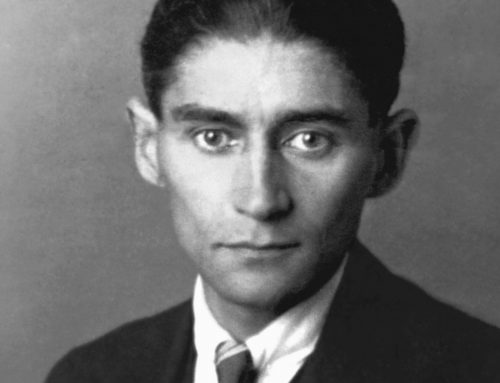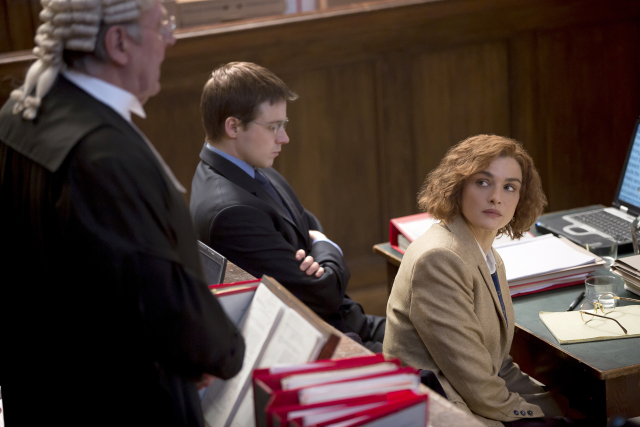
Rachel Weisz as writer and historian Deborah E. Lipstadt in “Denial.” Photo Credit: Laurie Sparham, Bleecker Street.
Last month the film “Denial” had its premiere in Seattle. A British-American drama directed by Mick Jackson and written by David Hare, the movie is based on the acclaimed book History on Trial: My Day in Court with a Holocaust Denier, recounting the eminent Emory University historian Deborah E. Lipstadt’s (Rachel Weisz) legal battle for historical truth against David Irving (Timothy Spall).
Irving accused Lipstadt of libel after she called him a Holocaust denier in her book, Denying the Holocaust: The Growing Assault on Truth and Memory, published in 1993.
On the surface, “Denial” is another cinematic courtroom drama. It may not be a good fit for movie viewers looking for action scenes and excitement. The movie can be criticized for its cinematographic quality, the elusiveness of the side stories, and occasional loss of focus.
But this post is not about any of those issues. It is about three important intellectual points that I had in mind when I left the movie theater:
What is proof and where to Find it?
As a Ph.D. student studying at University of Washington, I felt an instant connection with Professor Lipstadt, the author of History on Trial and the main character of the movie. Lipstadt started her teaching career at the University of Washington and was one of the founders of the Jewish Studies program (now the Stroum Center) where I have the honor of holding a year-long fellowship.
The opening scene of “Denial” is Lipstadt’s classroom lecture on the thought process of Holocaust deniers. After walking her students through each step, she asks the first question: “How can you prove that the Holocaust really happened?”
This question points to a broader discussion that academics are conducting on the types of information and knowledge accepted in specific academic fields. Cartesian logic imposes on social science similar methods and forensic techniques as those used by physical sciences. Is it possible for a historian to really “prove” anything? Is it necessary, or even possible?
Living in, or leaving, the past?
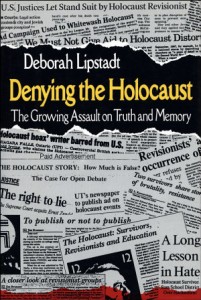
Deborah Lipstadt’s book, “Denying the Holocaust,” was published in 1993.
To be able to pay her British legal team, Lipstadt had to raise money. She turned to the usual suspects, the wealthy figures of the British Jewish community. Yet, they kindly refused to provide her the money she needed, arguing that rather than taking the discussion to court, she should consider settling with Irving. Their main point was that there are many like Irving in contemporary society and they have to live with them; better to leave the past behind.
In the second part of the movie, we encounter a different face of the British Jewish community that was not represented during the meeting with community leaders: Holocaust survivors. Besides closely following the libel trial, the group of survivors also reproaches Lipstadt for not letting “their voice be heard” by letting them testify about what happened in Auschwitz.
The juxtaposition between the community leaders’ and survivors’ stances can be translated to other suppressed, silenced, and massacred communities. Is it ever possible to forget the past?
Are all opinions equal?
The last question that the movie raises is maybe the most widely relevant, but also the least discussed. Irving feels personally attacked for his opinions, and his supporters accuse Lipstadt of being against freedom of speech. She answers these attacks in a press conference: “The freedom of speech means you can say whatever you want, but what you can’t do is to lie and expect not to be accountable for it… Not all opinions are equal.”
In the age of social media, ideas, opinions, and claims are equalized. The moral relativism of contemporary society gives all viewpoints equal time and leads to information pollution; the gap between truth and lie, reality and fiction is closing. Freedom of speech, which once protected people from being prosecuted for their thoughts, has been turned into a mechanism to protect liars, to distort and relativize the truth.
“Denial” is one of these rare contemporary movies that leaves you with big questions. If you are eager to think about the changing world around us, about our perceptions, and how history both shapes our present and was shaped by it, I strongly recommend that you watch “Denial.” It is too good an intellectual exercise to miss.
Links for Further Exploration
- “New Film about British Holocaust trial has UW connection” by Peter Kelley (September 2016)
- “Space, Society and Solar Panels in Israel” by Esra Bakkalbasioglu (April 2014)

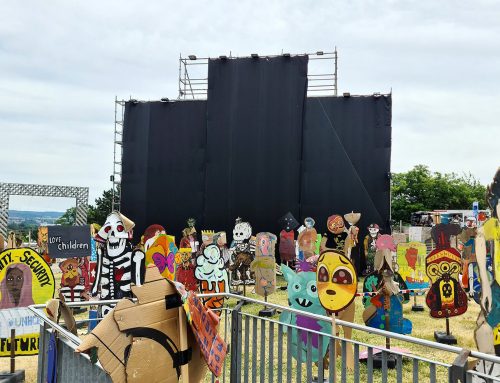
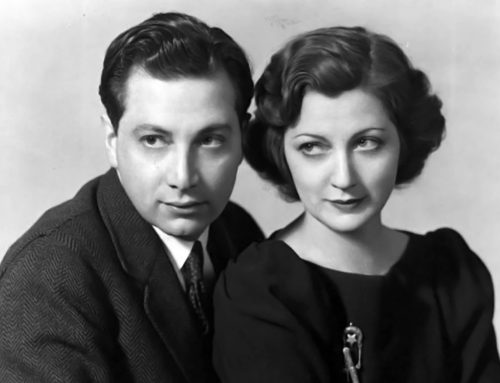
![Muestros Artistas [Our Artists]: Bringing Sephardic Art and Community Together at the UW](https://jewishstudies.washington.edu/wp-content/uploads/2023/08/UWJS_Muestros-Artistas-cropped-500x383.jpg)


